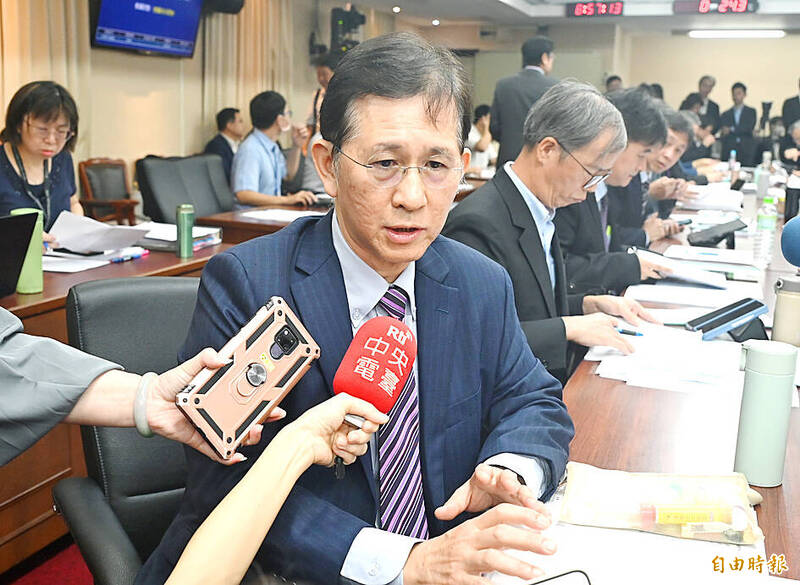《TAIPEI TIMES》 Cyberattacks did not harm firms: MODA

Minister of Digital Affairs Huang Yen-nun speaks to reporters on the sidelines of a meeting of the legislature’s Transportation Committee in Taipei yesterday. Photo: Wang Yi-sung, Taipei Times
ON THE ALERT: Most of the attacks were DDoS, which did not affect the companies’ internal systems, the ministry said, adding that it has a full grasp of the situation
By Shelley Shan / Staff reporter
Several private companies reported that their Web sites had experienced cyberattacks from overseas, but they did not sustain any substantial damages, the Ministry of Digital Affairs (MODA) said yesterday.
Minister of Digital Affairs Huang Yen-nun (黃彥男) made the remarks on the sidelines of a meeting of the legislature’s Transportation Committee after reporters asked him about the distributed denial-of-service (DDoS) attacks reported by Formosa Petrochemical Corp, Wistron Corp and United Microelectronics Corp.
The attacks came after pro-Russia hacker group NoName57 last month launched a similar attack against 45 government agencies.
After last month’s attacks, the ministry raised the national cybersecurity alert to the same level as the presidential election’s.
“The ministry and National Security Council officials have a full grasp of the situation. This time, some of the hackers were from NoName57, and we have shared the intelligence with other agencies,” Huang said. “However, we have yet to see if these attacks would lead to serious service disruptions or financial damages.”
Most of the recent cyberattacks were DDoS attacks, which did not invade the internal system, he said.
At the meeting, Huang told lawmakers that an Internet Fraud Reporting and Inquiry Network platform would officially be launched in December, adding that the ministry has rolled out a beta version of the platform for people to test it and provide feedback.
So far, about 2,000 people have downloaded the app, and most of the reported cases were related to investment, dating or invoice scams, he said.
Democratic Progressive Party (DPP) Legislator Lee Kun-tse (李昆澤) said some online shoppers reported that they suspected their accounts at online shopping site PChome might have been hacked, as the money they stored in their accounts was used up.
Huang said that hackers used credential stuffing, a method of cyberattack, to steal account credentials, which usually consist of usernames, e-mail addresses and passwords.
They then use the illegally obtained credentials to gain unauthorized access to user accounts in various systems, he said.
The accounts of the users who are suspicious were reportedly logged out and they were required to sign in again, he said.
“Aside from remembering their usernames and passwords, people should use multiple-step verification methods,” he said.
DPP Legislator Lin Chun-hsien (林俊憲) said that online platforms should reinstate the accounts of users who were hacked, rather than asking them to set up a new account.
“If online gaming service operators can fully reinstate their users’ accounts, so can messaging apps like Line,” Lin said, adding that Line’s service contract with users includes such an obligation.
Most of investment scam advertisements are found on Facebook, Huang said, adding that according to the Fraud Hazard Prevention Act (詐欺犯罪危害防制條例), which took effect in July, online advertising platforms could face a fine of up to NT$100 million (US$3.11 million) if they were informed about fraudulent advertising content on their platforms and fail to take action.
An amendment to the act would be proposed to hold platform operators liable for damages and financial losses caused by fraudulent content on their platforms, he said.
From the end of this year, those seeking to place advertisements on online platforms would be required to use their official names, as amendments to the Electronic Signatures Act (電子簽章法) were implemented in May, Huang said.
Facebook uses artificial intelligence to take down investment scam advertisements, which has reduced the number of investment scams from 80,000 per month to 14,000 per month, he said.
By Oct. 31, Google, Line, Meta and TikTok must have legal representation in Taiwan to make sure they comply with the government’s regulations to combat fraud, he said.
新聞來源:TAIPEI TIMES















